The voluntary Salah of a person from the sitting position is valid, and he receives half of the reward of the one who prays in a standing position. This is due to the Prophet’s saying: “If he prays standing it is better. And whosoever prays in the sitting position has half of the reward of those who stand. And whosoever prays lying down gets half of the reward of those who pray sitting.” [ Source: Al-Bukhari.]
However, if a person prays sitting down due to a valid excuse, he receives the full reward. This is due to the Prophet’s ﷺ saying: “If a man becomes sick or travels, it is written for him that which he used to do while in good health and not traveling.” [ Source: Al-Bukhari.]
The obligatory prayer of a person who is able to stand is not valid if it is prayed from a sitting position.
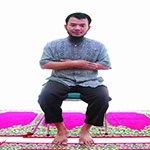
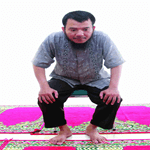
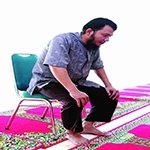
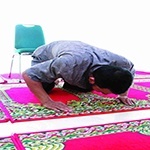
Some Rulings Related to the Intention ..
It is not permissible to intend to stop the prayer during the middle of the Salah; so whosoever intends to stop his prayer, he has actually left the prayer. He must then start his prayer all over again.
Whoever begins his prayer as a voluntary one may not switch his intention to make it an obligatory one.
Whoever has made the intention to pray an obligatory Salah alone, and then a group comes to pray it, may switch his intention to make the prayer a voluntary one. In this case he finishes two raka’at, and then joins the group.
It is obligatory for the person praying to recite surah Fatihah, even if he is following the imam in an audible Salah. It was reported on the authority of ‘Ubadah Ibn As-Samit t,, who said: “We were behind the Messenger of Allah ﷺ in the Fajr prayer and the Prophet recited, but then he found some difficulty in doing so. When he finished he asked: ‘Perhaps you all recite behind your Imam ?’ We said: ‘Yes it is so, O Messenger of Allah.’ He said: ‘Do not do this, except with the Fatihah as there is no Salah without the Fatihah.’” [ Source: Abu Dawud.]
It is Sunnah for each person making the Salah, whether they are leading, led, praying alone, praying an obligatory prayer or praying a voluntary prayer - in the prayers which are recited aloud and those recited in a soft voice alike. He says it in a soft voice in those prayers which are performed in a soft voice; and says it aloud in those which are recited aloud.
The evidence of this is in the Prophet’s saying: “If the imam says ‘Ameen’, then say ‘Ameen’; for indeed whosoever’s ‘Ameen’ corresponds with that of the angels, their previous sins will be forgiven.” [ Source: Al-Bukhari.]
1- Between saying the opening ‘Allahu Akbar’ and the recitation of the Fatihah (in order to recite the opening invocations in a soft voice).
2- It has not been established in the Sunnah that the imam remains silent between the Fatihah and the surah recited after it.
3- A silent moment after ending ones recitation; before bowing (Ruku’).
If a person misses a Salah and he wants to make it up, should he recite it aloud or in a soft voice? It depends on which prayer it is; and not the time in which one makes it up.
Therefore if one makes up a prayer normally made aloud, he recites it aloud when making it up during the daytime.
It is Sunnah to recite voluntary prayers in a soft voice except when there is evidence saying that it should be aloud, for example in Taraweeh and the Eclipse Prayer.
One raises his hands in the following places:
1- The opening Takbeerah
2- The Takbeerah for Ruku’
3- When standing from Ruku’
4- When standing after the first Tashahhud
If the follower is able to pray the Ruku’ with the Imam (when first entering the congregational prayer), then he is considered to have prayed this entire Rak’ah (unit of prayer). This is due to the Prophet’s saying: “Whoever makes the Ruku’, has caught the Rak’ah.” [ Source: Abu Dawud.]
It is an integral of the prayer that one remains still for a bit in each of the positions of the prayer. Otherwise the prayer is not valid. This is due to a hadeeth reported on the authority of Abu Hurairah t, who said: “The Messenger of Allah ﷺ entered the mosque, then a man entered after him and prayed. After that, he went to the Prophet and made Salam to him.Then the Messenger of Allah ﷺ returned his salutations and thereafter said: “Go back and pray because you have not prayed.” The man returned to pray as he had done before. He then went to the Prophet and greeted him. The Prophet ﷺ again answered him and said: “Go back and pray because you have not prayed.”
When this was done three times, the man said: “By He who sent you with the truth, I cannot do better than this. Please teach me.” The Prophet ﷺ said: “When you stand for Salah ; you should say ‘Allahu Akbar’, then read from the Qur’an what you can, and then bow until there is serenity in your bowing. Next rise up until you are balanced while standing, then prostrate until there is serenity in your prostration, and after that raise your head until there is serenity in your sitting. Then do these in all (the remainder of) your Salah.” [ Source: Al-Bukhari.]
It is not enough when reciting the Qur’an or pronouncing At-takbeer and words of Allah’s remembrance to say them just by one’s heart during Salat. Indeed, it is compulsory to utter the words by at least moving the tongue and lips during the recitation.
Prostration is on seven bones, as evidenced from the Prophet’s ﷺ saying: “When a servant (of Allah) prostrates, seven parts prostrate with him; his face, his palms, his knees, and his two feet.” [ Agreed upon.]
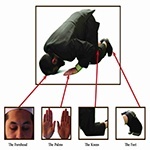
The tradition of the Prophet is to point with the (index) finger while reciting at-Tashahud. This is according to the hadeeth reported by Wail Ibn Hujr ,: “Then he ﷺ raised his finger and I saw him moving it and supplicating (while pointing) with it.” [ Source: An-Nasaee.]
- Say the intention aloud
- Add ‘wash-shukr’ after saying ‘Rabbanaa lakal-Hamd’; since this has not been established from the Messenger of Allah (may the peace and blessings of Allah be upon him.)
- Add the word ‘Sayyidunaa’ in the Tashahhud or when saying prayers for the Prophet in Salah.
- Point the right hand to the right when saying the first salam of the final Salams, and the left hand to the left when saying the second salam.
-Shake hands with others who have just finished praying and saying “Haram”, “Jama’an”, or similar words.
- Say after anyone reads the verse of the Throne after the prayer: “Glory be to Allah, so glorify Him,” or similar acts.
- Wipe the face after supplication and remembrance of Allah (Adhkar)